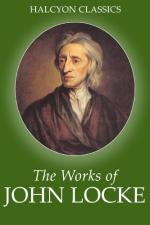|
This section contains 840 words (approx. 3 pages at 300 words per page) |

|
John Locke's Second Treatise of Civil Government
Summary: Provides synopsis of Locke's "Second Treatise of Civil Government." Examines its impact upon the writers of the American Declaration of Independence.
Throughout English philosopher John Locke's 1690 work, Second Treatise, of Civil Government, there is a focus placed upon the state of Nature, in which mean would respect the rights of others as well as their own rights. These inherent rights which go along with the idea of natural law, as famously noted by Thomas Jefferson in the Declaration of Independence, are life, liberty, and the pursuit of happiness (property). Ideally, no government would be necessary, but because of the failure of people to live up to these requirements, government is needed. Locke felt that it is the government role to allow people these rights, and to only do what is best for the people. If government fails to live up to these expectations, it can be voided by the people.
According to John Locke's Second Treatise, of Civil Government, all men are, "in a state of perfect freedom to...
|
This section contains 840 words (approx. 3 pages at 300 words per page) |

|


